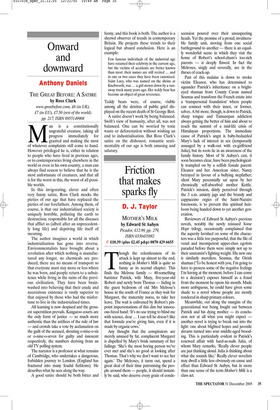Friction that makes sparks fly
D. J. Taylor
MOTHER’S MILK by Edward St Aubyn Picador, £12.99, pp. 279, ISBN 0330435892 ✆ £10.39 (plus £2.45 p&p) 0870 429 6655 Though the relentlessness of its attack is kept up almost to the end, nothing in Mother’s Milk is quite so funny as its second chapter. This finds the Melrose family — 40-something barrister Patrick, wife Mary, five-year-old Robert and newly born Thomas — hiding in the guest bedroom of old Mrs Melrose’s house in the south of France as they wait for Margaret, the maternity nurse, to take her leave. The wait is enlivened by Robert’s pinpoint impersonations of this dim but innocuous hired hand: ‘It’s no use trying to blind me with science, dear ... I can tell he doesn’t like that formula you’re giving him, even if it is made by organic cows.’ Any thought that the conspirators are merely amused by fat, complacent Margaret is dispelled by Mary’s brisk summary of her failings: ‘She’s the most boring person we’ve ever met and she’s no good at looking after Thomas. That’s why we don’t want to see her again.’ The Melroses, it turns out, spend a great deal of their time patronising the people around them — people, it should instantly be said, who deserve every grain of conde scension poured over their unsuspecting heads. Yet the promise of a proud, invulnerable family unit, moving from one social battleground to another — there is an equally wonderful scene in which they visit the home of Robert’s school-chum’s too-rich parents — is deeply flawed. In fact the Melroses, singly and severally, are in the throes of crack-up.
Part of this malaise is down to stroke victim Eleanor, who has determined to squander Patrick’s inheritance on a brighteyed shaman from County Cavan named Seumas and transform the French estate into a ‘transpersonal foundation’ where people can connect with their inner, or former, selves. A bit more, though, is down to Patrick, sharp tongue and Tamazepan addiction always getting the better of him and about to reach the summit of a mid-life crisis of Himalayan proportions. The immediate cause of Patrick’s angst is baby-bedazzled Mary’s lack of interest in sex (temporarily assuaged by a walk-out with ex-girlfriend Julia), but its roots lie in an awareness of the family history. Most of St Aubyn’s cast, it soon becomes clear, have been psychologically trampled on by a selfish female parent: Eleanor and her American sister, Nancy betrayed in favour of a bullying stepfather; silent Mary perennially sat upon by her chronically self-absorbed mother Kettle. Patrick’s mission, dimly perceived through the 3 a.m. anxiety jags and the brandy and cappuccino orgies of the Saint-Nazaire forenoons, is to prevent this spiritual heirloom being handed down to yet another generation.
Reviewers of Edward St Aubyn’s previous novels, notably the newly reissued Some Hope trilogy, occasionally complained that the asperity lavished on some of the characters was a little too purposeful, that the file of venal and incompetent upper-class egotists paraded before them were simply not up to their anatomist’s fighting weight. His new one is similarly merciless. Seumas, the Oirish shaman (‘To be honest with you, I’m going to have to process some of the negative feelings I’m having at the moment, before I can come to a decision’) exposes himself as a fraud from the moment he opens his mouth. Made more ambiguous, he could have given some shade to a novel whose people are mostly rendered in sharp primary colours.
Meanwhile, out along the margins of the generational war being fought out between Patrick and his dying mother — its conclusion not at all what you might expect another novel is trying to break out into the light: one about blighted hopes and juvenile dreams turned into sour middle-aged brooding. This is particularly evident in Patrick’s renewed affair with hard-as-nails Julia, of whom Mary remarks, ‘Really clever people are just thinking aloud. Julia is thinking about what she sounds like.’ Really clever novelists may dwell a little less obviously on cause and effect than Edward St Aubyn, but in more than one sense of the term Mother’s Milk is a class act.

















































 Previous page
Previous page